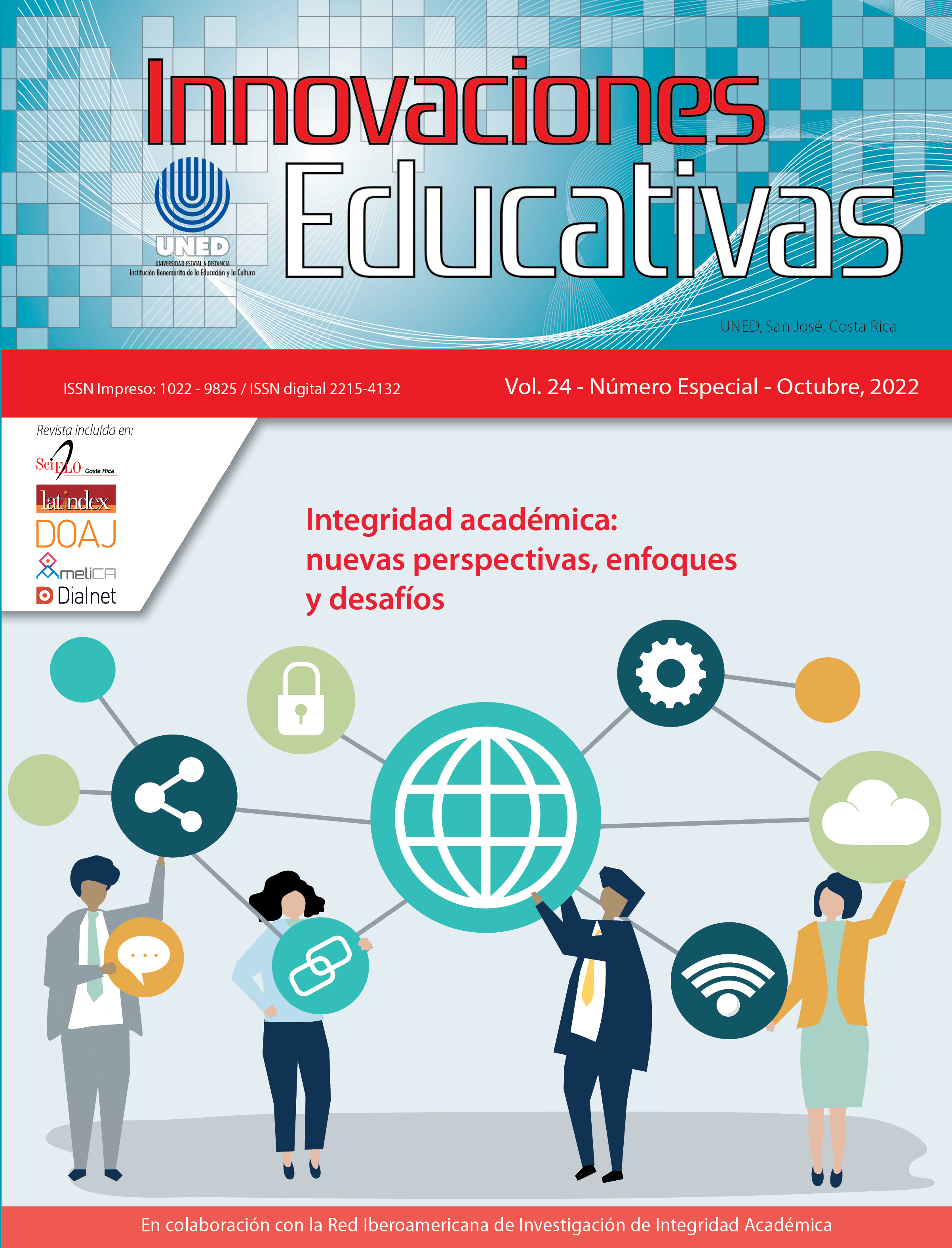The behavior of University Students Cheating in Tests Under Emergency Online Teaching Modalities by Academic Regulations.
DOI:
https://doi.org/10.22458/ie.v24iEspecial.4329Keywords:
Assessment system, academic fraud, alternative teaching, pedagogical innovation, summative assessment, university studentAbstract
This work is based on the social problems that university students' fraudulent habits can generate. Also, students' behavior concerning fraudulent practices associated with cheating in evaluations while teaching under the modality in emergency online teaching environments according to academic regulation is studied. We offer an analytic perspective on 60 students of the quantitative courses of economic sciences at three public universities in Costa Rica. The article focuses on an exploratory type of research developed through a qualitative data collection design; through fieldwork. In the context of education under emergency online teaching environments, the data obtained from the population interviewed shows a marked decrease in the realization of bad habits of fraud in course evaluations. Furthermore, students in these environments have the possibility of being able to consult the didactic materials that are used throughout the course as support for carrying out the tests. Through the investigation, it is possible to identify the main reasons that influence students to cheat in university academic evaluations, analyzing how emergency online teaching environments promote fraudulent habits supported by the technological resources available to students.
References
Beasley, E. M. (2016). Comparing the demographics of students reported for academic dishonesty to those of the overall student population. Ethics & Behavior, 26(1), 45-62. https://doi.org/10.1080/10508422.2014.978977
Beléndez-Vázquez, M.; Comas-Forgas, R.; Martín-Llaguno, M.; Muñoz-González, A. y Topa-Cantisano, G. (2011). Plagio y otras prácticas académicamente incorrectas entre el alumnado universitario de nuevo ingreso. IX Jornadas Redes de invesfigación en docencia universitaria. https://web.ua.es/es/ice/jornadas-redes-2011/documentos/posters/184404.pdf
Brown, B. y Emmett, D. (2001). Explaining variations in the level of academic dishonesty in studies of college students: Some new evidence. College Student Journal, 35(4), 529. https://www.semanticscholar.org/paper/Explaining-Variations-in-the-Level-of-Academic-in-Brown-Emmett/e365e1bf9f74f1d9b3403a63ac4d80ada2578469
Ceballos-Villada, Z. R. (2011). Comportamientos, pensamientos y sentimientos frente al fraude académico en ámbitos universitarios: Institución universitaria CESMAG Universidad Mariana. https://ciencia.lasalle.edu.co/cgi/viewcontent.cgi?article=1567&context=maest_docencia
Cronan, T. P.; Mullins, J. K. y Douglas, D. E. (2015). Further Understanding Factors that Explain Freshman Business Students’ Academic Integrity Intention and Behavior: Plagiarism and Sharing Homework. Journal of Business Ethics, 147(1), 197-220. https://doi.org/10.1007/s10551-015-2988-3
Davis, S.; Grover, C.; Becker, A. y McGregor, L. (1992). Academic dishonesty: Prevalence, determinants, techniques and punishments. Teaching of Psychology, 19(1), 16-20. https://www.researchgate.net/publication/242520878_Academic_Dishonesty_Prevalence_Determinants_Techniques_and_Punishments
Fernández, J. y Ordóñez, C. (2004). El fraude académico en la Universidad de los Andes. ¿Qué?, ¿qué tanto? y ¿por qué? Revista de Estudios Sociales, (18), 369-375. https://doi.org/10.7440/res18.2004.01
Jaffe, D. L. (2015). Academic cheating fact sheet. https://web.stanford.edu/class/engr110/cheating.html
Lam, P. y McNaught, C. (2006). Evaluating designs for web-assisted peer and group assessment. Self, Peer and Group Assessment in E-Learning, 210-244. https://doi.org/10.4018/978-1-59140-965-6.ch009
Marrades, C. y Véliz, M. (2022). Experiencia pedagógica: enseñanza remota de emergencia de la asignatura Física en la Universidad Nacional de Tucumán. Revista Innovaciones Educativas, 24(37). https://revistas.uned.ac.cr/index.php/innovaciones/article/view/3819
Martinez Gomez, A.; Borjas, M. P. y Andrade, J. J. (2015). El fraude académico universitario: el caso de una universidad privada en la ciudad de Barranquilla. Zona Próxima, (23). https://www.redalyc.org/pdf/853/85344718005.pdf
Ramírez, A. S. (2019). El plagio: un dolor de cabeza para estudiantes y académicos. En E. Serna (Ed.), Revolución en la formación y la capacitación para el siglo XXI (pp. 373-376). Instituto Antioqueño de Investigación. https://doi.org/10.5281/zenodo.4266554
Sureda-Negre, J.; Cerdá-Navarro, A.; Calvo-Sastre, A. y Forgas, R. C. (2020). Las conductas fraudulentas del alumnado universitario español en las evaluaciones: valoración de su gravedad y propuestas de sanciones a partir de un panel de expertos. Revista de Investigación Educativa, 38(1), 201-219. https://doi.org/10.6018/rie.358781
Sureda-Negre, J.; Comas-Forgas, R. y Oliver-Trobat, M. F. (2015). Plagio académico entre alumnado de secundaria y bachillerato: Diferencias en cuanto al género y la procrastinación. Comunicar: Revista Científica de Comunicación y Educación, 22(44), 103-111. https://doi.org/10.3916/comunicar
Teodorescu, D.; Andrei, T.; Tusa, E.; Herteliu, C. y Stancu, S. (2007). Analyzing the Students' Academic Integrity using Quantitative Methods. Journal of Applied Quantitative Methods, 2(2), 211-220. https://www.academia.edu/8719819/ANALYZING_THE_STUDENTS_ACADEMIC_INTEGRITY_USING_QUANTITATIVE_METHODS1
Turrens, J.; Staik, I.; Curtis, W. y Burling, J. (2002). Undergraduate academic cheating as a risk factor for future professional misconduct. En N. H. Steneck y M. D. Scheetz (Eds.), Proceedings of the First ORI Research Conference on Research Integrity: 19–20 November 2000 (pp. 42-49). Office of Research Integrity. https://ori.hhs.gov/documents/proceedings_rri.pdf
Wiesenfeld, K. y Jaramillo, L. G. (2011). Cómo se consiguen las buenas calificaciones. Revista Universidad EAFIT, 45(156), 104-106. https://publicaciones.eafit.edu.co/index.php/revista-universidad-eafit/article/view/14
Downloads
Published
How to Cite
Issue
Section
License
Copyright (c) 2022 Innovaciones Educativas

This work is licensed under a Creative Commons Attribution-NonCommercial-NoDerivatives 4.0 International License.

